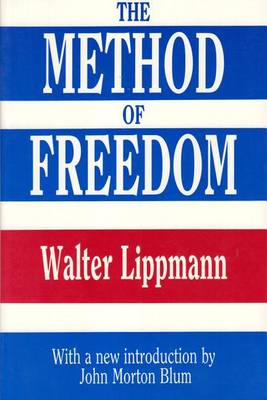The Method of Freedom was written at a time of deep anxiety for America and Europe. The worst depression in modem history gripped the world and the rise of dictatorships in Europe and Asia posed a mortal challenge to the essentials of free government. In this volume of a continuing series on the major works of Walter Lippmann, a model for economic recovery and social stability is outlined under a "regime of liberty." Lippmann's work takes on a special pertinence in the 1990s as the nations of Eastern Europe embark on the historically unprecedented transition from Communist centralization to democracy and free market economies.
Rejecting both laissez-faire and centrally enforced collectivization, Lippmann described the salutory economic functions of a government with a mandate that rested on the consent of a middle-class constituency, which he termed a "free collectivism." Capitalism, in his view, had become too complex to be regulated by private initiative, and it became the function of government to ensure a compensatory redistribution of income and property in order to make its citizens comfortably secure.
Lippmann recognized that market regulation needed to be safeguarded from political demagoguery and the tyranny of the majority. The Method of Freedom calls for the formation of an informed and competent managerial class to direct economic policy within the bounds of legislative consent. Lippmann's effort to balance the competing claims of capitalism and democracy anticipated the New Deal achievements of the 1930s and influenced a generation of American statesmen in their understanding of what constituted a good society. The Method of Freedom is a work of enduring interest
- ISBN10 1560005599
- ISBN13 9781560005599
- Publish Date 30 January 1991
- Publish Status Out of Print
- Out of Print 15 June 2021
- Publish Country GB
- Publisher Taylor & Francis Inc
- Imprint Transaction Publishers
- Format Paperback
- Pages 146
- Language English
